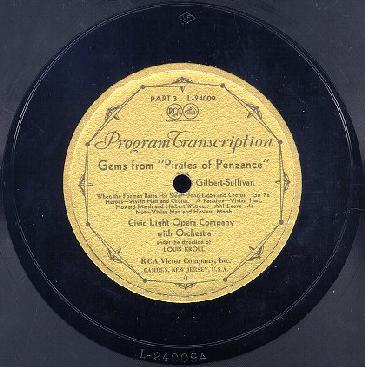Civic Light Opera Company Pirates (1932)
Reported by Bruce Miller
Civic Light Opera Company of New YorkCity |
|
This recording was a companion to the Civic Light Opera Mikado, issued in the same year, in the same format. (See the detailed comments on that recording.) Like the Mikado set, it was issued on two long-playing records that complemented each other, but were sold separately. The contents (transcribed exactly from the Victor catalogues) were as follows:
- L-24008:
- Opening Chorus of Pirates – I Am a Pirate King – Climbing Over Rocky Mts. – Oh! Is There Not One Maiden – Poor Wand'ring One – I Am a Major General – I Am an Orphan Boy – Although One [sic] Dark Career – Pray Observe
- L-24009:
- When The Foeman Bares His Steel – Go Ye Heroes – A Paradox – Ah! Leave Me Not – With Cat-like Tread – Now What Is This – Finale
The general remarks contained in the companion review of the Civic Light Opera Company's Mikado Gems apply also to their records of Pirates.
The Pirates set begins with one of the worst professional performances (perhaps the worst) of Samuel's first solo on records. The uncredited singer begins and ends "For to-day our Pirate 'prentice" on the correct pitches, but only incidentally hits the ones in between.
Herbert Watrous as the Pirate King takes a good direction with the role, but his interpretation has an air of incomplete authority and he is easily outclassed by his famous D'Oyly Carte counterparts. He, also, disrespects Sullivan's music by turning the verse of "I am a Pirate King" into a recitative.
About the best one can say about Frank Moulan is that he sounds like a poor man's Henry Lytton — he has all of Lytton's flaws and few of his attributes. His wrong notes become, quite quickly, annoying, and he is forced to take some high notes down an octave.
Vivian Hart is more interesting as Mabel. She seems to have been a good actress, as her varying performances as Ruth and Mabel in this set demonstrate. As a singer she is less successful. The high notes that we are allowed to hear (never higher than unfortunately flat B-flats, with only the G's sometimes lingering) are sweet but malnourished. Her pitch often sags, most notably on the high notes, due to her breath support problem.
Whether she has the high range and flexibility required for "Poor wand'ring one" is not possible to judge because the most difficult coloratura is cut; both cadenzas are excised from the Act I aria, and her music in the Act II finale is severely curtailed. As the latter number contains the only instance of significant rewriting in the Civic Light Opera series, it must be assumed that either Mabel or the chorus was (or both were) not up to the vocal demands. The chorus merely repeats, in unison, the refrain starting with "Poor wand'ring one" rather than singing the multiple part writing Sullivan gave for the final "Take heart, take heart, take heart, take ours!"
Ms. Hart sings Ruth's role only in the Act I Finale ("Oh, master, hear one word, I do implore you") and in the Paradox trio (only in the ensemble; her solo verse is cut). Even these brief glimpses confirm her considerable acting range, although vocally she is not suitable for contralto roles.
"Ah, leave me not to pine" displays Ms. Hart to her best advantage, as it does (when he gets the notes and words right) Howard Marsh. The long, final note of the duet is too much for the tenor, who drops out long before Ms. Hart does. How inconsiderate of the soprano and conductor.
As Frederic, Marsh is not the most perfect nor completely accurate singer ever recorded, but he does have the technique to carry off honorably the florid ending of his Act I aria, "However plain you be, I'll love you," etc.
John Eaton has the range and a decent vocal quality for the Sergeant of Police, but otherwise he is undistinguished.
One noteworthy aspect of this recording is that the original portion of the Act II finale, with the girls singing "Oh, spare them! They are all noblemen who have gone wrong" through the Pinafore quotation, "What, all?" "Well, nearly all!" is included. Not only that, it is sung convincingly, despite the bleeding cut required to take the music from "Well, nearly all!" back to the fast chords before "No Englishman unmoved that statement hears." That they could handle this usually difficult transition so effectively, while botching so much else, is a true Paradox.
Other verbal anachronisms perpetuated by the singers, doubtless resulting from their using older vocal scores, include "Pour, O King, the Pirate sherry" and "I am the very pattern of a modern Major-General."
The conductor's name is an oddity: it is given as Louis [sic] Kroll on this recording, but "Lewis [sic] Kroll" on the companion Mikado set.
| Date | Label | Format | Number | Comments |
|---|---|---|---|---|
| Apr. 20, 1932 | RCA Victor | 10" Double-Sided Long-Playing Records |
L-24008 L-24009 |
Manual side couplings |
| ca. 1933-4 | RCA Victor | 10" Double-Sided Long-Playing Records |
AL-24025 AL-24026 |
Slide automatic side couplings |

